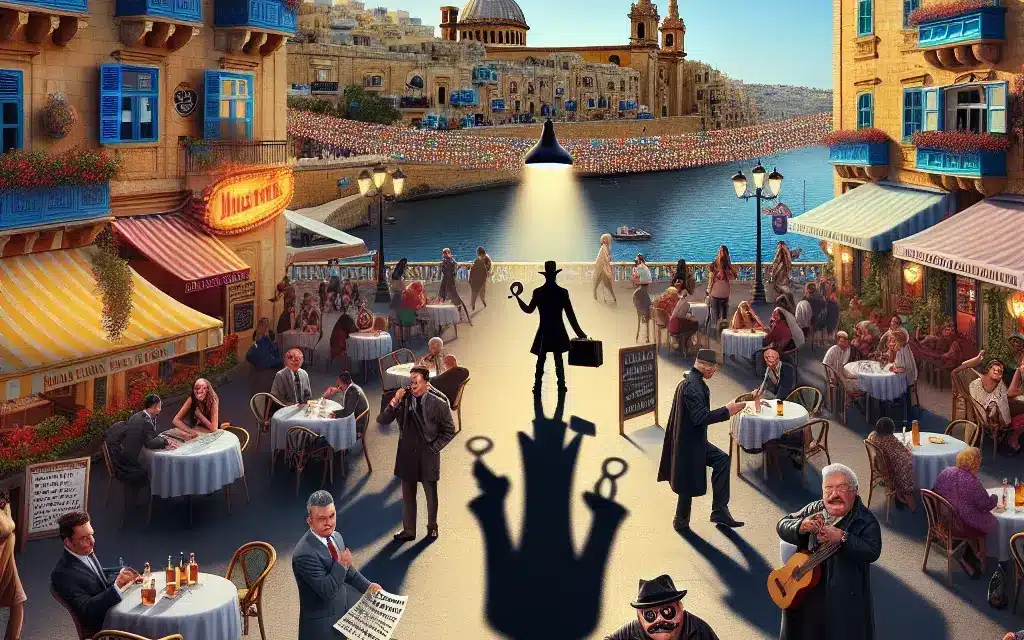Gone with the Għana: Malta’s Most Musical Heist
The Case of the Disappearing Ditty
In the heart of Sliema, nestled between the buzzing cafes famous for ħobż biż-żejt, and the picturesque promenade, a mystery had struck a chord with the locals. Kompla Kabana, Sliema’s most reputable kazin tal-banda, had been robbed! But not of money, oh no. The thief had taken something far more precious – the original scores of Malta’s legendary folksongs known as għana.
Suspicions were running as high as an operatic tenor at La Valletta’s Manoel Theatre. The heist wasn’t just ingenious, it was practically an art form; the scores vanished without a so much as a do-re-mi, leaving the police as puzzled as tourists trying to pronounce “Qawra”.
Suspects More Twisted Than Gozo’s Roads
The island was buzzing with gossip about who could have orchestrated such a melodiously meticulous crime. “Mela, this is crazier than trying to find parking in Mdina during the medieval festival,” remarked Inspettur Tabib, Malta’s surprisingly sharp and utterly baffled detective, who also happened to be an undercover għana enthusiast.
The suspects included a who’s who of the local music scene:
- Filfla Fenech, the accordionist whose fingers were quicker than a rabbit disappearing into a stew.
- Karmni Kampanella, the voluptuous soprano known for hitting high notes and low blows.
- Ħamrun Ħalib, the eccentric beatboxer with a penchant for pastizzi and beat-dropping at heritage sites.
“Belt-ilu” Bygone Ballads
“Uwejja, you find me someone without an alibi on the night of the Festa,” quipped Ċensa Ċomb, Filfla’s maligned harmonica-playing ex-girlfriend known for her ħalitosis and her harmonies. “Kollox is a suspect, if you ask me!”
The inspector had his work cut out for him, especially since the only lead was a mysterious note left at the scene that read “Għannej steals the tune but never the show.”
The Great Għana Getaway
It was on the eve of the Valletta International Baroque Festival, while the Inspector was pondering over a plate of lampuki pie, that the unexpected struck. A live għana performance was hijacked mid-verse by a sudden blackout, followed by a spotlight shining on a shadowy figure holding the missing manuscripts.
“It was me, Ħamrun Ħalib!” he declared with a dramatic flair. “And I would have gotten away with it if it weren’t for me own love for the spotlight!”
The Beatboxer’s Ballad Blunder
Ħamrun’s confession rocked the crowd like a Luzzu in a storm. Not only had he stolen the scores, but he had also planned to integrate them with his beatboxing routines to create a new genre he called GħanaBoxing. The idea had merit but executing it through theft? That was as out of tune as a karaoke night at a Gozo farmhouse.
Inspettur Tabib, in true Maltese fashion, delivered justice as only a local could – by orchestrating a deal. Ħamrun would return the scores, and in exchange, he was to teach għana classes to youths, inspiring the next generation of singers, with community service to the sound of Malta’s heartstrings.
Restored Rhythms
The scores were returned to Kompla Kabana, and harmony was restored, just in time for the band to play at the village festa. As for Ħamrun Ħalib, he became something of a local hero, and as words of his beats spread, he was nicknamed ‘The Mellieha Metronome.’
Now, if you ever walk down the streets of Sliema, you might just hear the whispers of a għana carrying in the breeze, a reminder that in Malta, even the crimes strike a uniquely tuneful note. Just remember, next time you find some mysterious scores, think twice before you take them home – they could be the island’s next greatest hit, or the makings of Malta’s most musical heist.
And at the ‘Times of Mela,’ we’ll be right here, ready to tell you all about it, one għana verse at a time.







Recent Comments